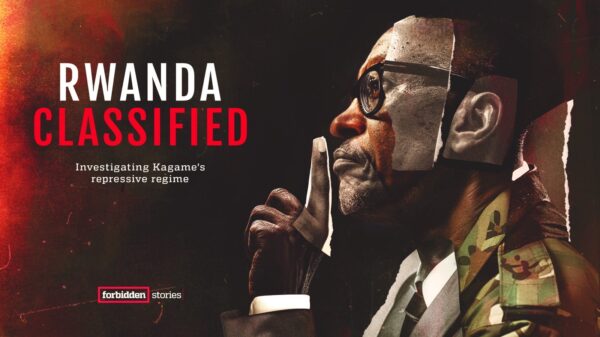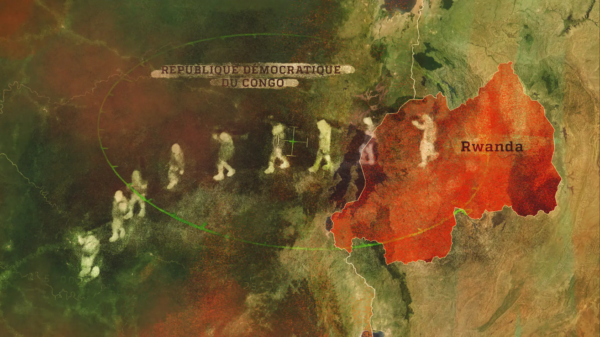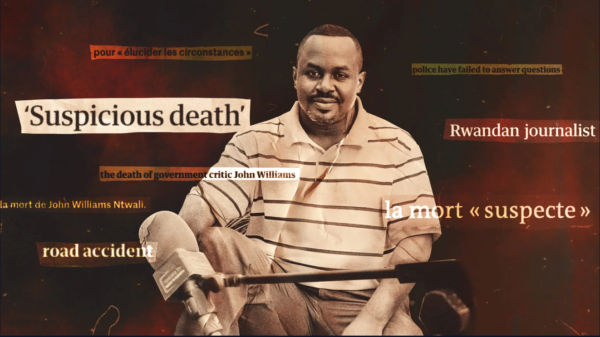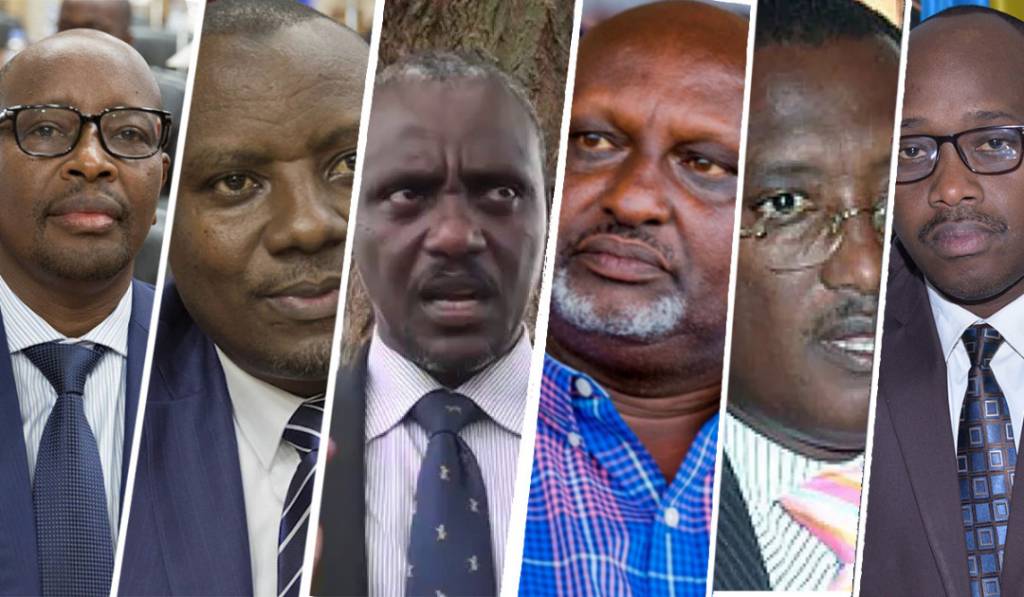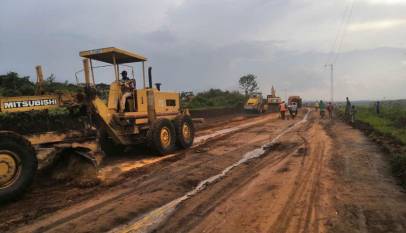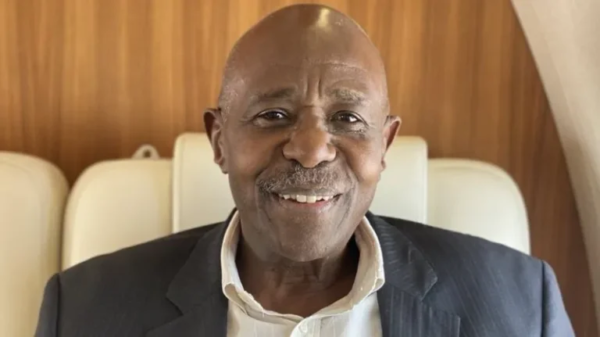Five men are in custody for allegedly withholding the food meant for the vulnerable in their localities. The food was a central government scheme to feed the poorest during the COVID-19 lockdown. All of the men are village leaders from different areas.
These five suspects, awaiting possible prosecution and jail, form part of a large local officialdom spanning across Rwanda. They wield so much power and influence over the lives of the communities they lead. Very often, they are happy to misuse that power.
Away from officials stealing COVID-19 food, in a separate case, a farmer in Musanze district is serving 3year jail term for offering bribe of Rwf 3,000 ($3.3) to local official. He was also fined Rwf 6,000 during conviction – double the bribe he gave.
There are hundreds others like this farmer in jail, others have completed their sentences, or are still in court – all victims of the tough stance adopted by the government in Rwanda against corruption. However, as The Chronicles reports from a review of government data from the past three years, the harsh response to corruption is catching what are commonly known in Rwanda as “Udufi duto” (small fish).
Between 2016-2019, a total of 650 people have been convicted for various forms of corruption, mainly bribes. At least 96 percent of these are MEN, which seems to suggest the face of bribery here is ‘male’.
Perhaps shocking as well is the fact that 85.7% of the convicts are between ages 25-40 years, giving the understanding that young people are helping to keep the corruption flame alive. Commenting on the trend, Tito Rutaremana, Chairperson of Rwanda Elders Advisory Forum and a key ideologue of the ruling Rwanda Patriotic Front party (RPF) wondered at a government conference; “Why are young people in such a hurry to get rich quick. They want riches without sweating!”
The Ombudsman’s Office which leads the country’s anti-corruption fight keeps track of the corruption convictions. The three year data which we reviewed shows those in jail are peasants including farmers, drivers, motorcyclists (abamotari), cyclists (abanyonzi) and small traders. Actually, over 80% on the list were accused of offering or receiving less than Rwf 30,000 ($31) bribe.
The total number and cases of corruption and convicts in last three years

The single biggest corruption case, which the Ombudsman Anastase Murekezi and the judiciary keeps bragging about at government press conferences is that of an official from electricity provider Rwanda Energy Group (REG) who is said to have embezzled Rwf 90m ($100,000).
Also, Ombusdman’s three year reports indicate that only 6 Police Officers, 1 RIB officer, 2 lawyers and1prosecutor, 2 employees of SONARWA, 3 SACCO accountants – or 29 people in total were convicted of corruption involving Rwf 1m or more.
So is Rwanda’s anti-corruption crusade on right track, and if not, what is wrong? Does it mean people are not stealing or exchanging large sums of money? How come the so called “Ibifi binini” (or big fish) are not getting caught? These, and many other issues are the subject of this story.
First, we opted to put everyone reading this report on same page with what corruption means in Rwanda’s laws. A tougher amended law on corruption N° 54/2018 states that corruption is much more than simply exchange of money. It appears in the form of embezzlement where taxpayer money is stolen, favoritism, fraud, nepotism and seeking or offering sexual favor.
Corruption is reflected in the following acts: a) to solicit, accept or offer illegal benefit; b) to solicit, promise or offer sexual favors; c) to make a decision based on favoritism, friendship, hatred, acquaintances or nepotism; d) influence peddling; e) to illicit enrichment; f) embezzlement; g) to use public property for unintended purposes ) to misuse property of public interest; i) illegal exemption; j) to demand or receive undue or excessive money; k) abuse of functions; l) appropriation of unlawful favors.
With this detailed outline of what corruption is, The Chronicles went fishing for what is happening in each of the corruption facets.
First, the Auditor General’s report says that at least Rwf7.9billion was lost through wasteful, unauthorised, unsupported and fraudulent expenditure in the 2016/2017 financial year that ended on June 30, 2017.
The level of wasteful expenditure resulting from diversion of public resources and unsupported transactions had reduced from Rwf17.7 billion in the previous report which had considered 139 public entities and projects with 85% of the reported government expenditure in the year ended June 30, 2016.
For 2017-18 financial year, AG says a whooping Rwf 267 billion ($284m) of the taxpayers money allocated to big projects, has no accountability. The money disappeared with no trace. In the AG’s own words “yaburiwe irengero”. The current budget for the ministry of agriculture, a sector which employs the vast majority of Rwandan, is Rwf 136billion.
Remember the missing billions are for a single financial year. Year in year out, the Auditor General complains that billions of expenditures are unsupported, wasted, overstated, or payment to non-existing staff.
The blame game
The question of who is responsible never gets answered – leaving President Paul Kagame and his team blaming the other. He blames the institutions in charge, they blame prosecution, it also blames courts, that also blame society for not reporting. The Auditor General reveals big amounts but doesn’t name names. Parliament, for its part, is never short of theatrics; MPs rage in seeming anger at Auditor General’s reports, then summon low level officials who are embarrassed before media recorders and cameras.
The Ombudsman is left alone in the cold. At an arranged press conference on May 31 last year, Murekezi, himself a former Prime Minister, had called media to share “good news” about successful corruption convictions. Instead, he struggled to defend the report as journalists asked him to name a single ‘big fish’ convicted.
“Corruption is at all levels in Rwanda,” admitted Ombudsman Murekezi, citing Transparency’s Rwanda bribery INDEX of 2O18 which showed that 33% of corruption cases involve procurement officials and private companies bidding for government contracts.
He added: “Those 33% are not farmers, they are high profile people and powerful business-people who are offering bribes to high-level government officials.” (However, these are not convictions)
“We can’t say there is any place with no corruption….corrupt acts are committed by many people of different levels. What we are presenting here (that day) are cases that went up to courts and attracted convictions. The list is prepared by the Supreme Court.”
The positions of corruption convicts sentenced in last three years
Advocacy group Transparency Rwanda has been regularly compiling the annual ‘Rwanda Bribery Index’, which largely highlights what people feel, and also compiles isolated cases of people claiming to have paid cash bribes, or been in situation where an official seeks favours from them.
The 2019 index released early this year shows that 18.5% Rwandans paid bribes to get a service. Transparency attempted to put an amount, as the total bribes paid being Rwf 17billion. It is not such a big amount of money, but is more than budget of Nyarugenge district in Kigali which is Rwf 16.9 billion.
Institutions or sectors where most Rwandans reported to Transparency to have paid the biggest bribes are Traffic Police, agents of the Rwanda Investigations Bureau (RIB) and in TVET colleges by parents and students.
Transparency Rwanda has also for years denounced what it has branded as ‘ruswa y’igitsina’ or sexual favours. However, its leader Marie Immaculee Ingabire has been making general statements without naming names. On local radio talk shows, allegations of senior government officials and business executives seeking sex from young women for jobs, are a regular occurrence. None of the victims ever comes forward.
The “BIG FISH”?
In early February, as President Kagame was opening the annual government retreat, he shockingly revealed that he had fired education state minister Dr Isaac Munyakazi for soliciting a meager Rwf 500,000 bribe. It was a shock to public because this amount is about 30% of his monthly salary as a minister.
When Kagame fires his ministers, he usually leaves it to speculation as to the reasons. This time, his explanation reignited muted debate on corrupt people within the category of the dismissed minister.
Range of bribes paid or received
Over the years, there have been highly publicised high profile arrests and prosecutions. They are many. The Chronicles has only put together ten such cases in the past few years. Convictions are rare.
FERWAFA – Around 2013, world football governing body FIFA offered to fund construction of an 88-room sports hotel for local body FERWAFA. It was to cost Rwf 4billion. In 2016, Ferwafa president Vincent ‘De Gaulle’ Nzamwita, the secretary general and another businessman were charged over the project. Nzamwita was acquitted of favouritism, flouting procurement procedures and corruption. One of the other two accused went to jail for three years, another for six months.
Today, there is a new leadership at Ferwafa. The hotel has not been built, Ferwafa lost Rwf 200m and is said to have a debt of over Rwf 932million owed to the Chinese construction firm. No information available about Nzamwita’s whereabouts.
Former State Minister Evode Imena – In 2016, a young State Minister for Mining, Evode Imena, was dismissed, arrested and put on trial for causing loss of more than Rwf 686m to a private company Nyaruguru Mining Company Ltd. He was accused of using his office to revoke the firm’s licence and denying it business, which was believed to have been done in bad faith.
The case was seen at the time as one test of how political power is misused. However, in December 2017, Nyarugenge Intermediate Court dismissed all charges against the State Minister Imena, saying that there was no incriminating evidence. Court also dismissed the case filed by businessman Straton Ndamage.
ADEPR CHURCH – Since March 2017, up until today, a group of 12 senior pastors and financial managers of the Pentecostal Church of Rwanda or ADEPR stand accused of conniving to steal Rwf 3.3billion from the church coffers. The disappearance of the money nearly caused a revolt in ADEPR. Acting on intelligence reports, President Kagame reportedly ordered Police and then prosecutor general to take up the case. It was coming to election period, and Kagame couldn’t afford to have the nearly 2m unhappy ADEPR followers.
The case, as The Chronicles has reported widely, is currently at the appeals level. The church’s lawyer appealed against acquittal of the senior pastors. It emerged in the appeal that former prosecutor general and his deputy maneuvered to delay the case by constantly changing state prosecutors. It is difficult, at this point, to say what exactly their role is, in the loss of such a huge amount of church tithe.
Former Kigali mayor, also minister, Theoneste Mutsindashyaka – Between 2010-11, Theoneste Mutsindashyaka, then the minister of state for education in charge of primary education, was accused in 2009 of causing the government to lose funds amounting to Rwf1.7billion in collusion with other officials.
He was sentenced to five years in jail by the Kacyiru Primary Court and sent to the Kigali Central Prison, commonly known as “1930.” Mutsindashyaka however battled the charges and was acquitted in the middle of the following year by the appeals court. The Nyarugenge Intermediate Court also cleared Mutsindashyaka of concealing foreign bank accounts from the Ombudsman. He currently holds regional body office.
Pudence Rubungisa – There is also the case of the current mayor of Kigali City Pudence Rubungisa. In August 2017, the news media erupted into frenzy with his arrest for causing financial loss of Rwf 1billion to the University of Rwanda (UR) where he was deputy vice chancellor for finance and administration.
According to the charge sheet, Rubingisa at different times, authorized payments to the contractor, despite there being no works on the ground to justify the payment. Rubingisa is said to have successful battled the charges, was acquitted, but no one else has been held accountable for the fraud.
Businesman Paul Muvunyi – There is the case of businessman Paul Muvunyi, who until recently was chair of Rayon Sports, a very popular team in the local league. More than 20 years ago, he managed a state pyrethrum company. Rwf 1.1billion disappeared from the company’s coffers. Earlier, a separate payment by Kenya Pyrethrum Board for liquid Pyrethrum totaling $1.2m was made, but it has never appeared on the Rwandan company’s accounts when Muvunyi was director.
A court case has been ongoing for nearly 12 years to recover a total of Rwf 8.2billion. It has dragged on up to the Supreme Court. In March this year, Muvunyi made a public plea through the media to President Kagame claiming some people are out to bankrupt him. The billions lost in the pyrethrum company are not talked about.
REB Director-Generals – At the Rwanda Education Board (REB), two former Director-Generals, Janvier Gasana and Dr. John Rutayisire were acquitted last year of any role in the disappearance of Rwf 249m. Nobody else has taken their place to take responsibility for the loss of this money.
They connived to give tender for keeping XO laptops whereby they signed off hiring the space at Rwf 26,000 per square meter – which is way too much compared to market price of about Rwf16,000 or less. Their acquittal came after the businessman involved was suddenly reported by prosecutor general as missing. No court summon or arrest warrant was ever issued.
Karongi house project – The Chronicles reported last month of a project back in 2012 to build 384 houses in Karongi district. Only 11 houses were built. A report by the Ombudsman contains wrong information on the project, and no single individual has been brought to book over the mess. Billions simply lost in thin air!
Rwanda Development Bank fertilizers – The only high profile conviction that has stood is that of Alex Kanyankole, former CEO of the Rwanda Development Bank. In June last year, a Kigali court jailed him for 6 years for controversially awarding an $8.1m contract for supply of fertilizers to company called Top Services. He also helped another company get Rwf 500m loan from his bank. Court ruled he had gotten kickbacks of nearly Rwf 100m from different places.
However, despite the many millions he may have received, Kanyankole was ordered to pay fine of Rwf 22.5m. In other words, if he still had the millions he got from the companies he helped, after he completes his sentence, he will return to enjoy his full account – thats if he didn’t share the spoils.
The list of such heavily publicised trials is long. But they all read as a similar script; mediatised dismissal, arrest, prosecution, and then some jail time as suspect battles for bail. By the time the verdict is delivered, the country has moved on, and no one remembers the lost money.

